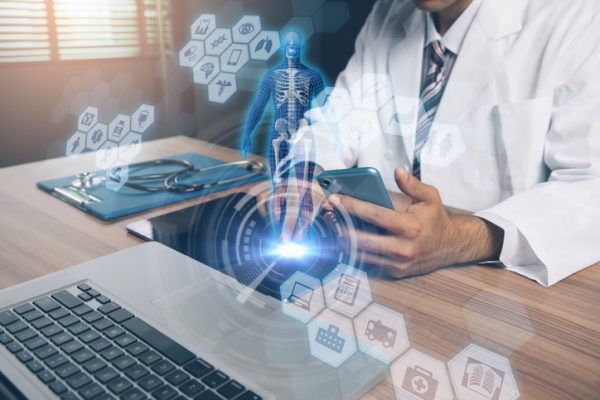
Technology has changed a lot since I was a practicing pharmacist. While clinicians have always focused on using technology to improve patient safety, everything else about technology is constantly evolving.
For example, clinicians have relied on technology to check medications to optimize patient outcomes throughout the last 50 years. This technology has advanced, from CD ROM to cloud-based applications and beyond, to make sure clinicians have the information they need to make the best possible decisions for their patients.

With the Rise of AI, What IP Disputes in Healthcare Are Likely to Emerge?
Munck Wilson Mandala Partner Greg Howison shared his perspective on some of the legal ramifications around AI, IP, connected devices and the data they generate, in response to emailed questions.
Technology evolved over these five decades to respond to the needs of users. Based on my experience and interactions with other leaders in the market, here are three technology trends I expect in 2024.
1. Healthcare providers want immediate access to emerging evidence.
The pandemic changed many things, including the expectations of clinicians using technology. To address Covid-19, clinicians indicated that dynamic evidence was more valuable than having no evidence to help them make difficult decisions. This desire to have greater access to emerging evidence has continued post-pandemic.
However, the nature of quickly evolving evidence is that these early iterations often need ongoing research and refinement. For example, more than 10,000 research articles were retracted in 2023 alone, a new annual record. In healthcare, it’s imperative that any reference to research is current, updated, or removed from materials to minimize the risk of patient harm.
Today’s technology makes it possible – and essential – to share and update information quickly. It’s far different from the days when information resided in books that were outdated almost as soon as they arrived in hospitals.
It’s a powerful capability to put emerging science in the hands of clinicians quickly. Such responsibility means the data must
- be presented clearly so clinicians can understand the strength of the recommendation and the evidence behind the recommendation to make informed decisions.
- remain updated as research evolves.
2. Generative AI will serve information (and misinformation) faster.
Every technology presents opportunity and risk and requires strong safeguards for all capabilities. Generative AI, now disrupting many industries, is a powerful tool with great potential when pointed to the correct data.
There are studies with potentially flawed data or methodologies, even from seemingly reputable sources, and estimates indicate a myriad of bogus “paper mill” articles litter the web. It’s essential for experts to critically evaluate the quality of evidence and focus on the best available evidence before generative AI tools use this information to support clinical decision-making.
Generative AI also has the potential to “hallucinate,” meaning it generates false or biased information. While AI can serve up information more quickly, it will be essential to have the proper protections in place. These protections may include preventing the technology from providing a recommendation without strong enough evidence and informing the user about the strength of the evidence behind the answer.
Additionally, employing a walled garden approach – which directs users’ navigation within a closed environment, preventing access to unverified material – would provide another layer of quality control. These considerations are imperative when applying generative AI capabilities to technology in the healthcare environment.
3. Healthcare providers want easy-to-consume information they can trust.
The way people consume information has changed over time. Most users are eager for a direct, objective synopsis they can trust – and don’t have time to search through evidence. By improving access to content – surfacing it through electronic health records and mobile applications, such as tablets at the bedside, for example – clinicians can access answers more quickly, when and where they need them most.
While presenting short consumable bits where clinicians need them is essential, it’s still insufficient. It’s imperative that these easy-to-consume answers are backed up by rich content when clinicians need to dig deeper. When clinicians combine their expertise with solid, research-backed data, it results in better decisions and better outcomes for patients.
Pairing technology with clinical expertise is the key to better clinical decision-making. No matter how technology evolves, it will be up to clinicians to take the best of what it offers to help improve lives. The clinicians I know are passionate about taking care of people, and that’s always been at the heart of health IT: People using technology to take better care of people.
Photo: metamorworks, Getty Images
Tina Moen, Pharm.D. provides clinical leadership in the healthcare information technology industry as General Manager for Micromedex by Merative, a recognized clinical decision support brand celebrating its 50th anniversary in 2024. Before Merative, she was Senior Deputy Chief Health Officer and Chief Pharmacy Officer with IBM Watson Health and held leadership positions with Wolters Kluwer and Truven Health Analytics. Dr. Moen received her Doctor of Pharmacy degree from Creighton University. She previously worked as a clinical pharmacist in pediatrics, home healthcare, HIV, and organ transplantation.














